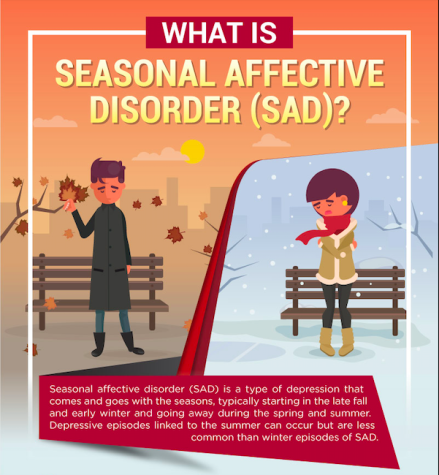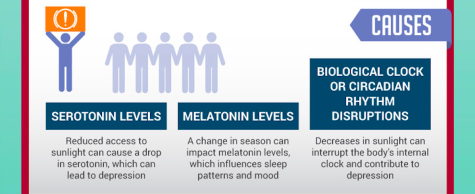CLC students weigh in on how midwinter weather weighs them down
March 8, 2022
After the excitement around the holiday season dies down and winter isn’t as refreshing as it is dreary, many students feel the effects of seasonal depression and low motivation. The dull, frigid, sunless weather coupled with the beginning of a new semester often makes it difficult for students to stay productive and interested in their coursework, becoming overwhelmed and burnt out. Like any other school, students at CLC also struggle with seasonal depression.

Two students gave their thoughts on the effects of seasonal depression on productivity during the transition into the spring semester. “I do believe that seasonal depression is a real thing that students may feel during the winter months. The cold can slow our central nervous system, which can slow cognitive responses, making school seem slower,” said sophomore Aidan O’Sullivan.
Another student, Alyssa Pagan, shared her experience. “I totally think it’s more common than people think. The days feel shorter, yet the workload becomes heavier with big essays, projects, and exams coming up,” she said. “The pressure we increasingly feel as students worsen when we belittle ourselves for being “too lazy” or “not smart enough” for staying on track.”
Many students are negatively impacted by the lack of sun and low temperatures, causing them to stay inside, creating a host of issues. Students can become isolated, fatigued, and deficient in vitamin D, which we receive from sunlight. Not only does the weather affect our mood, but also our mental health. Those already struggling with depression, anxiety, or other mental health issues can spiral deeper into their thoughts, which is why it is so crucial for students to remain active and social even during uneventful Illinois winters.
If the weather is already bringing students down, how are they supposed to succeed in an academic environment? It is very easy for schoolwork to be neglected and grades to fall when students are dealing with their mental health, which is why schools and students must recognize the reality of this issue.
Despite many college students dealing with the effects of seasonal depression, not all hope is lost. There are many ways schools can support their learners, and students can uplift themselves. “It would be super helpful if colleges used newsletters, Canvas announcements, or their own professors to spread awareness and offer services, said Pagan. “The interactions between one’s academic/ job responsibilities and mental health goes both ways, so even acknowledging the influences of the seasons can provide students relief.
“Schools can offer events to get students to be further engaged,” said O’Sullivan. “This could be through music in café Willow or something of that sort. Libertyville High School had hot chocolate on Fridays during December, so maybe CLC can do something

like this throughout the winter.”
There is an evident decline in social events and activities during the winter months, and this is only worsened due to the covid restrictions. Schools and clubs can get creative to bring students together in new ways, whether that be through the aforementioned greenhouse study spaces, events, or just by finding new ways to keep students connected and engaged.
Students can also support themselves by creating routines and good study habits and holding each other accountable. “I have to plan ahead and stay disciplined to accomplish what I have written down,” said sophomore Noah Styczen.
“I try to give myself ten-minute breaks in-between every task, but ten minutes turns into an hour, sometimes,” said Pagan. “Alternatively, I don’t allow myself “rewards” until I finish what I need to, such as phone time or a lengthy episode during a meal break.”
It is equally important for students to recognize when their mood is low and implement healthy self-care strategies to support themselves. “I normally plan out my assignments due throughout the week, along with working out 5-6 days a week in order to stay active,” said O’Sullivan. “I normally workout after my classes and use it as something to look forward to and push through the day.”
Finding small things to boost morale and release stress is crucial, especially when winter is working against us. No one is alone in feeling the weight of seasonal depression, and if you are struggling with mental health or coursework, it is imperative to reach out to friends, family, or the support systems in place at CLC to receive the support you need.
Those interested can find information for CLC’s Counseling and Psychological Services page here.







